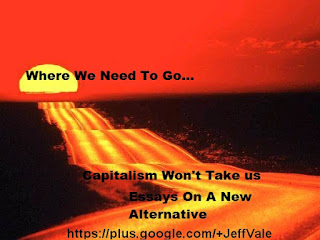Racism plays into another aspect here, marginalization itself; whereupon you need only be a group the powerful don't like for whatever reason; as in sexism. Ageism. Anybody who would question power as it now exists. Etc. Marginalization is important in its own right in this context because it makes sure that there will always be an easily manipulated underclass of fodder for whatever purpose; as in fighting your conflicts of resource control, or market access, as well as keeping a subservient working class to have an ongoing check against the automators, and robot creators, from having whatever would be power player by the balls if they want to do major production of something.
There is also the problem of the lack of socially essential information flow to consider. How can you know socially unacceptable (for both moral, and practical aspects of human interaction, reasons) things are going on if certain groups are allowed to be exempt from providing it. Would bad coach pedafiles be nearly the problem if we kept better track of such skill segments across the boards for all institutions in the nation? Would priests? Would bad cops? Bad doctors? Etc. And by the same token, would predatory lending practices for one group, as opposed to another, be in evidence at all if we did not have even the skimpy comparative data we have now (Red Lining went on for quite a while in some cities before it was noticed and made public).
So what are we to do here? I, for one, have become a firm believer in the idea that you just cannot legislate against stupidity, whether it is willful ignorance or not. And trying to pretend that these people don't exist because we've moved on from racism, because we have minorities in relative positions of power now, isn't going to cut it anymore either. So, for my part I think we should do what Don Corleone always told his boys to do: "you keep your friends close, but your enemies closer." And in this I mean we need to accept their existence; make them state it openly, and if they want to live in communities of only one type of characteristic, then let them do so. Setting themselves up as as semi independent City States, like any other like minded group (Google people, after all, might want to stay together as an information services provider community for hire, for instance, whereas creative Hollywood types might keep independent cinema going as a barter export, or a hundred other examples). Then, everybody will be free to barter among City States as they see fit. And people who value a diversity of minds, and perceptive styles, and myriad kinds of creative strengths, can join together in their communities.
None of this can happen, however, until we accept the fact that Capitalism is done for. It is kaput. Finished and long past the date where even a hazardous waste cite could hold it now. We may not be able to change certain aspects of human nature (though a better way or organizing ourselves could sure help), but we can change a system that now plays on all of our darkest primal needs, and fears. A system that not only puts way too much power into the hands of individuals, stupid beliefs or not, it also makes having any sense of critical social information not even anything an "ordinary" citizen should concern oneself about; because all they really need to know, in this ever more mutated monster, is that they must simply work, and buy, as they are told to work and buy, and to shut the
intercourse up otherwise.
The referenced article quick list:
1:Why won’t the US Supreme Court do anything about racism?
2:A Killing Season
3:Does systematic racism drain, deny and diminish black homeowners' wealth?
4:The future of software isn’t an app. It’s a habit
5:Uncertainty over late GI Bill payments leave lawmakers asking -- Who is accountable?
Why won’t the US Supreme Court do anything about racism?
A Killing Season
Does systematic racism drain, deny and diminish black homeowners' wealth?
[Post Note: You know, of course, that when they say "habit" what they really mean, whether they are aware of it or not, is addiction; addiction as the new, sure way to ensure brand loyalty. J.V.]
The future of software isn’t an app. It’s a habit
Uncertainty over late GI Bill payments leave lawmakers asking -- Who is accountable?
See Also:
[Post Note: Not only are things so screwed up that very little of what is actually important gets done, one other aspect of this is that, even if you could get the consensus to spend a very large amount of money, to make a baseline for wages to not fall below, the myriad current contradictions of Capitalism, as well as its now over abundant amount of conflicting complexity (because it has already been amended so many times), the unintended effects of this sort altruism become so convoluted, and potentially damaging that any benefits, would be negated to a quite large degree. And that's assuming you could find a pocket to take the money from in the first place. J.V.]







No comments:
Post a Comment